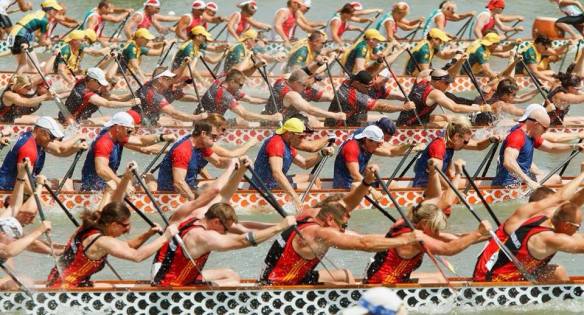The Top Ten Ways to Improve Your Paddling: Tips From the Experts
Recently, I asked my fellow paddlers what they considered to be some of the best ways to improve one’s paddling ability. Whether you are aiming to make your local team’s boat or earn a spot on the national team, these wise words from some of the top paddlers in the USA are sure to help you up your game!

World Championships, Hungary 2013, from top: Hungary, Australia, Canada, United States, Germany. Photo credit: Tommy Leonardi, Team USA
1. Listen to feedback. Be humble and open to coaching….there is always room for improving. Take your coach’s advice. Feedback is a good thing, ask the coach where you need improvement. Listen to your coach and make those changes. Heck, even make the changes when their feedback is directed at other people. Don’t have an ego. We all have room for growth. You may have in mind what you think you look like while paddling. We all would like to think we look perfect while paddling. Your coach can ACTUALLY see what you look like while paddling. LISTEN to him or her. Unless you are paddling in front of a mirror, your coach’s eyes are the best mirror you’ve got. If your coach has stopped giving you feedback, it’s time to ask why. Perhaps it’s because he or she has not seen you striving to make the changes that have been pointed out to you. Maybe you’ve been giving excuses instead of making attempts at improvements in technique. If you are dedicated to getting better, ASK your coach to “pick on you” (that’s what my paddlers call it), and try to sit in a seat where the coach can see you well.
2. Practice regularly. Practice. Practice more. Practice harder. Practice more intently. Practice with more focus. Practice sprints. Practice distance. Practice hitting the catch. Practice the body of the stroke. Practice the stroke finish. Practice with someone who knows proper form. Paddle often, with focus and intent. Stay focused during practice. Focus on improving one single aspect of technique with each paddle. Keep pounding that change into your muscle memory until your body will make that exact motion in your sleep. Then go on to your next technique change. Get into the boat with an area in mind that you want to work on. Be willing to change your area at a moment’s notice. Don’t forget the basics. Have good form and body mechanics. Practice that on both sides. Paddling is one of the easiest sports to develop bad habits….and bad habits are hard to break. Strive for consistency.
3. Watch video reviews as often as possible. Think about video review sessions, frame, by frame, by frame, watching the smallest of flaws stretched out for all to see…Ahh, good times. You just want to hold your hands over your eyes and die as that little flick of water comes off the blade because you’re feathering too soon (again), but you know that’s what you have to fix (A very personal example…from Bob Mina, Team USA paddler). And when the coach gives you feedback, accept it. Don’t make excuses. Make a point of working on it.
4. Paddle happy and relaxed. Don’t paddle with mean people. If you don’t like the people you paddle with, seek good people. They’re out there. Surround yourself with good people. You’ll be motivated to raise your game. Enjoy the process. Aim to relax and be fluid while you are working your ass off. Keep your chin up, gaze ahead and breathe.
5. Watch the best paddlers and try to mimic their technique. Have your favorite paddlers sit with you and copy their movements. Don’t be scared or intimidated to sit with more experienced paddlers. Don’t be afraid to paddle with people who are more aggressive than you. They’ll be the ones more likely to point out things that might go un-checked. As you improve at some point, you will be scratching for hundredths of a second, and that’s where you will feel most vulnerable and frustrated…but that’s where you have to be to keep improving.
6. Add to your toolbox. Get out on small boats. Small boat work will help you explore ways of making the boat move better. Practice often in OC-1, OC-2, C-1 and/or C-2 with excellent paddlers to emulate. Listen to what different coaches have to say, as long as they are coaching a similar technique. What one coach says in just a slightly different way might click, then what each of them says keeps building.
7. Don’t underestimate the power of cross training. Spend time in the gym. Improve your strength to weight ratio. Also, cardio, cardio, cardio! More oxygen to your muscles = more power output, and the ability to keep up a high heart rate longer without “red-lining,” especially for those high intensity, short sprints. A lot of us don’t enjoy running, (we’re paddlers!) but getting out every day for even just a 5k will do wonders for your paddling fitness. Swimming is also excellent for your cardio. Paddling isn’t just about having a strong upper body and good technique, it’s cardio too! Also, use a heart rate monitor so you really know how hard you’re working.
8. Avoid excuses. When you are given that all-so-important feedback, take it, internalize it, use it to your advantage. Don’t give the coach a million reasons why you can’t or shouldn’t do what is being asked of you. Do your best to at least TRY to modify your technique to make it better. It may not happen overnight, but a coach will be more impressed at seeing attempts and progress than hearing excuses and seeing no change in your technique.
9. Visualization. Find what works for you in terms of visualizing what your body needs to do to accomplish your team’s technique. Rotation? Imagine reaching for a doorknob, a lottery ticket, a million dollars, a hand to shake. Moving the boat forward? Picture sitting on a skateboard and propelling yourself forward by planting a stick in the ground and pulling yourself forward on that skateboard. Finding hard water at the catch? Picture pole vaulting to engage those lats! Visualize your body achieving the technique you are striving for.
10. Eat right. You’ve heard the saying, “You are what you eat.” Well, that might not be too far off…pay attention to how your body responds to various foods you eat. Make sure you are fueling your body right in order to be your most powerful self for each and every training session. Chances are good that you will train and race better with healthy food fueling you than with a giant piece of chocolate cake (as much as we all love the cake!)
So, there you have it: ten great ways to become a better paddler. Whether your goal is to be on your country’s national team, or to make your local race boat, these tips are sure to help you see improvements.
A HUGE thank you to all my paddling friends who contributed to this post with the strategies they use to improve their paddling: Bob Mina, Leah Varga, Shannon Walker, Alice Brennan, Sam Trotter, River Horan, Megan Kress, Joann Fegley, Pawel Rutkowski, Aixa Ramos, Hype Jersey, Gaston Sanchez, Thomas Yoo, Mary Schlimmer, Jennifer Peters, Raquel Riano, Andrew McMarlin, Julie Deters, Stefanie Mullins, Beverly Sorrells, Liisa Reimann Rivera, Meridith Greenbaum, Ken Wong, Bryan Schang, and Kate Trotter.






Thanks for all the useful information
Could you provide video example of good techniques? I recently saw this on kayaking with overhead shots on a vasa erg – https://www.youtube.com/watch?v=hUgDjWQPMsI
Thanks for the good ideas
Great idea Jeff! Let me spend some time looking through various videos I have and those I have seen online and I will come up with something to share. Thanks for the idea!
A good reflective article with pointers that will help those across the spectrum of paddling experience. Thanks for some items of realisation in which I need to pay more attention to.
Thanks Primo!
getting ready for the upcoming race! thanks for this!
I will follow these steps as best as I can to be a better paddler with my coaches help Megan Kress.
Megan is a super coach. You are in good hands!
Great advice! I’ve shared it as food for thought for my club members to take into the next Australian racing season.
Thanks! I’m glad you enjoyed it. Good luck this season!
Something for all paddlers
Scanning through this and some of your other posts I have to say THANK YOU! Excellent insights and advice. I am primarily a SUP racer and started racing DB for anaerobic interval training. Of course I fell in love with the intensity of the races, my teammates and the sport. Totally hooked. Sigh…so little time, so much water to paddle in. M
I’m glad you are enjoying the posts and thanks for reading! SUP is great cross-training and loads of fun. And I completely agree – so little time, SO much water to paddle in!!
Hello Kristen,
Thank you for all your wonderful tips. I agree that first one has to be coach able. And there is ALWAYS room to improve. This is only my third year paddling and I am on Edmonton’s Breast Cancer Survivor’s Team. I am very grateful to have amazing coaches including a lead coach who likes to push us all to our max. I also have a lot of respect for the women I paddle with. I absolutely love this sport!! We had the pleasure of paddling in Sarasota last year for the International BC Festival and we had lots of fun. Thank you for your blog and I will definitely continue to visit it. Enjoy the sun!!
Thank you for taking the time to write. I’m glad that you are enjoying the posts! I was working on the docks at Sarasota last year, so it is likely that we crossed paths. Keep training hard – the next International BC Festival is going to be amazing!